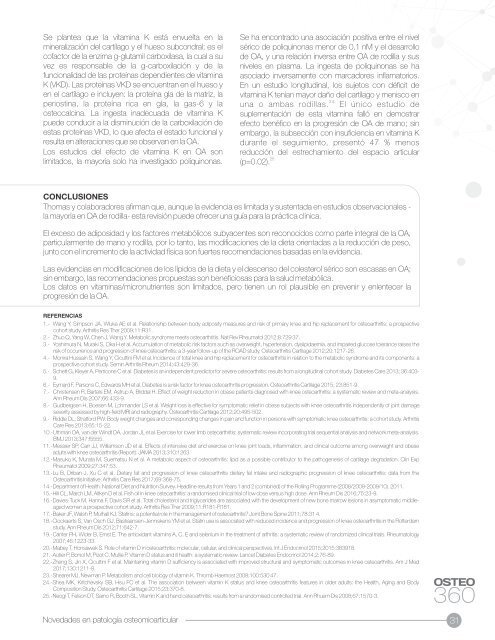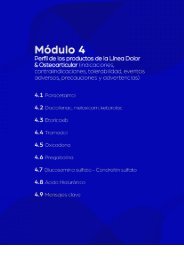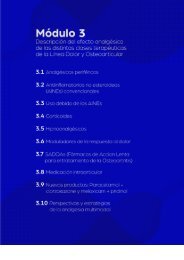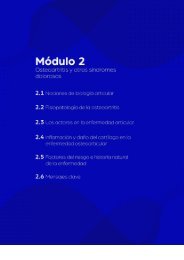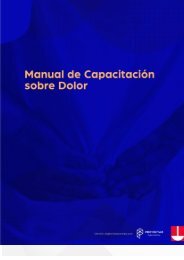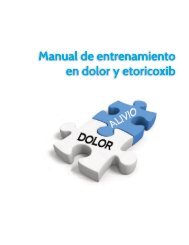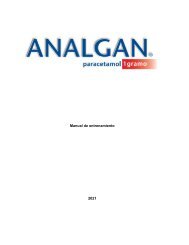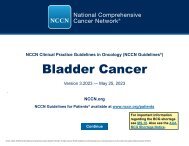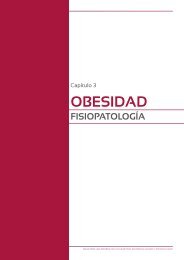Create successful ePaper yourself
Turn your PDF publications into a flip-book with our unique Google optimized e-Paper software.
Se plantea que la vitamina K está envuelta en la<br />
mineralización del cartílago y el hueso subcondral; es el<br />
cofactor de la enzima g-glutamil carboxilasa, la cual a su<br />
vez es responsable de la g-carboxilación y de la<br />
funcionalidad de las proteínas dependientes de vitamina<br />
K (VKD). Las proteínas VKD se encuentran en el hueso y<br />
en el cartílago e incluyen: la proteína gla de la matriz, la<br />
periostina, la proteína rica en gla, la gas-6 y la<br />
osteocalcina. La ingesta inadecuada de vitamina K<br />
puede conducir a la disminución de la carboxilación de<br />
estas proteínas VKD, lo que afecta el estado funcional y<br />
resulta en alteraciones que se observan en la OA.<br />
Los estudios del efecto de vitamina K en OA son<br />
limitados, la mayoría solo ha investigado poliquinonas.<br />
Se ha encontrado una asociación positiva entre el nivel<br />
sérico de poliquinonas menor de 0.1 nM y el desarrollo<br />
de OA, y una relación inversa entre OA de rodilla y sus<br />
niveles en plasma. La ingesta de poliquinonas se ha<br />
asociado inversamente con marcadores inflamatorios.<br />
En un estudio longitudinal, los sujetos con déficit de<br />
vitamina K tenían mayor daño del cartílago y menisco en<br />
2 4<br />
una o ambas rodillas. El único estudio de<br />
suplementación de esta vitamina falló en demostrar<br />
efecto benéfico en la progresión de OA de mano; sin<br />
embargo, la subsección con insuficiencia en vitamina K<br />
durante el seguimiento, presentó 47 % menos<br />
reducción del estrechamiento del espacio articular<br />
25<br />
(p=0.02).<br />
CONCLUSIONES<br />
Thomas y colaboradores afirman que, aunque la evidencia es limitada y sustentada en estudios observacionales -<br />
la mayoría en OA de rodilla- esta revisión puede ofrecer una guía para la práctica clínica.<br />
El exceso de adiposidad y los factores metabólicos subyacentes son reconocidos como parte integral de la OA,<br />
particularmente de mano y rodilla, por lo tanto, las modificaciones de la dieta orientadas a la reducción de peso,<br />
junto con el incremento de la actividad física son fuertes recomendaciones basadas en la evidencia.<br />
Las evidencias en modificaciones de los lípidos de la dieta y el descenso del colesterol sérico son escasas en OA;<br />
sin embargo, las recomendaciones propuestas son beneficiosas para la salud metabólica.<br />
Los datos en vitaminas/micronutrientes son limitados, pero tienen un rol plausible en prevenir y enlentecer la<br />
progresión de la OA.<br />
REFERENCIAS<br />
1.- Wang Y, Simpson JA, Wluka AE et al. Relationship between body adiposity measures and risk of primary knee and hip replacement for osteoarthritis: a prospective<br />
cohort study. Arthritis Res Ther <strong>20</strong>09;11:R31.<br />
2.- Zhuo Q, Yang W, Chen J, Wang Y. Metabolic syndrome meets osteoarthritis. Nat Rev Rheumatol <strong>20</strong>12;8:729 37.<br />
3.- Yoshimura N, Muraki S, Oka H et al. Accumulation of metabolic risk factors such as overweight, hypertension, dyslipidaemia, and impaired glucose tolerance raises the<br />
risk of occurrence and progression of knee osteoarthritis: a 3-year follow-up of the ROAD study. <strong>Osteo</strong>arthritis Cartilage <strong>20</strong>12;<strong>20</strong>:1217-26.<br />
4.- Monira Hussain S, Wang Y, Cicuttini FM et al. Incidence of total knee and hip replacement for osteoarthritis in relation to the metabolic syndrome and its components: a<br />
prospective cohort study. Semin Arthritis Rheum <strong>20</strong>14;43:429-36.<br />
5.- Schett G, Kleyer A, Perricone C et al. Diabetes is an independent predictor for severe osteoarthritis: results from a longitudinal cohort study. Diabetes Care <strong>20</strong>13; 36:403-<br />
9.<br />
6.- Eymard F, Parsons C, Edwards MH et al. Diabetes is a risk factor for knee osteoarthritis progression. <strong>Osteo</strong>arthritis Cartilage <strong>20</strong>15; 23:851-9.<br />
7.- Christensen R, Bartels EM, Astrup A, Bliddal H. Effect of weight reduction in obese patients diagnosed with knee osteoarthritis: a systematic review and meta-analysis.<br />
Ann Rheum Dis <strong>20</strong>07;66:433-9.<br />
8.- Gudbergsen H, Boesen M, Lohmander LS et al. Weight loss is effective for symptomatic relief in obese subjects with knee osteoarthritis independently of joint damage<br />
severity assessed by high-field MRI and radiography. <strong>Osteo</strong>arthritis Cartilage <strong>20</strong>12;<strong>20</strong>:495-502.<br />
9.- Riddle DL, Stratford PW. Body weight changes and corresponding changes in pain and function in persons with symptomatic knee osteoarthritis: a cohort study. Arthritis<br />
Care Res <strong>20</strong>13;65:15-22.<br />
10.- Uthman OA, van der Windt DA, Jordan JL et al. Exercise for lower limb osteoarthritis: systematic review incorporating trial sequential analysis and network meta-analysis.<br />
BMJ <strong>20</strong>13;347:f5555.<br />
11.- Messier SP, Carr JJ, Williamson JD et al. Effects of intensive diet and exercise on knee joint loads, inflammation, and clinical outcome among overweight and obese<br />
adults with knee osteoarthritis (Report). JAMA <strong>20</strong>13;310:1263.<br />
12.- Masuko K, Murata M, Suematsu N et al. A metabolic aspect of osteoarthritis: lipid as a possible contributor to the pathogenesis of cartilage degradation. Clin Exp<br />
Rheumatol <strong>20</strong>09;27:347 53.<br />
13.- Lu B, Driban J, Xu C et al. Dietary fat and progression of knee osteoarthritis dietary fat intake and radiographic progression of knee osteoarthritis: data from the<br />
<strong>Osteo</strong>arthritis Initiative. Arthritis Care Res <strong>20</strong>17;69:368-75.<br />
14.- Department of Health. National Diet and Nutrition Survey. Headline results from Years 1 and 2 (combined) of the Rolling Programme (<strong>20</strong>08/<strong>20</strong>09-<strong>20</strong>09/10). <strong>20</strong>11.<br />
15.- Hill CL, March LM, Aitken D et al. Fish oil in knee osteoarthritis: a randomised clinical trial of low dose versus high dose. Ann Rheum Dis <strong>20</strong>16;75:23-9.<br />
16.- Davies-Tuck M, Hanna F, Davis SR et al. Total cholesterol and triglycerides are associated with the development of new bone marrow lesions in asymptomatic middleaged<br />
women a prospective cohort study. Arthritis Res Ther <strong>20</strong>09;11:R181-R181.<br />
17.- Baker JF, Walsh P, Mulhall KJ. Statins: a potential role in the management of osteoarthritis? Joint Bone Spine <strong>20</strong>11;78:31 4.<br />
18.- Clockaerts S, Van Osch GJ, Bastiaansen-Jenniskens YM et al. Statin use is associated with reduced incidence and progression of knee osteoarthritis in the Rotterdam<br />
study. Ann Rheum Dis <strong>20</strong>12;71:642-7.<br />
19.- Canter PH, Wider B, Ernst E. The antioxidant vitamins A, C, E and selenium in the treatment of arthritis: a systematic review of randomized clinical trials. Rheumatology<br />
<strong>20</strong>07;46:1223-33.<br />
<strong>20</strong>.- Mabey T, Honsawek S. Role of vitamin D in osteoarthritis: molecular, cellular, and clinical perspectives. Int J Endocrinol <strong>20</strong>15;<strong>20</strong>15:383918.<br />
21.- Autier P, Boniol M, Pizot C, Mullie P. Vitamin D status and ill health: a systematic review. Lancet Diabetes Endocrinol <strong>20</strong>14;2:76-89.<br />
22.- Zheng S, Jin X, Cicuttini F et al. Maintaining vitamin D sufficiency is associated with improved structural and symptomatic outcomes in knee osteoarthritis. Am J Med<br />
<strong>20</strong>17;130:1211-8.<br />
23.- Shearer MJ, Newman P. Metabolism and cell biology of vitamin K. Thromb Haemost <strong>20</strong>08;100:530 47.<br />
24.- Shea MK, Kritchevsky SB, Hsu FC et al. The association between vitamin K status and knee osteoarthritis features in older adults: the Health, Aging and Body<br />
Composition Study. <strong>Osteo</strong>arthritis Cartilage <strong>20</strong>15;23:370-8.<br />
25.- Neogi T, Felson DT, Sarno R, Booth SL. Vitamin K and hand osteoarthritis: results from a randomised controlled trial. Ann Rhuem Dis <strong>20</strong>08;67:1570-3.<br />
Novedades en patología osteomioarticular<br />
OSTEO<br />
<strong>360</strong><br />
31


